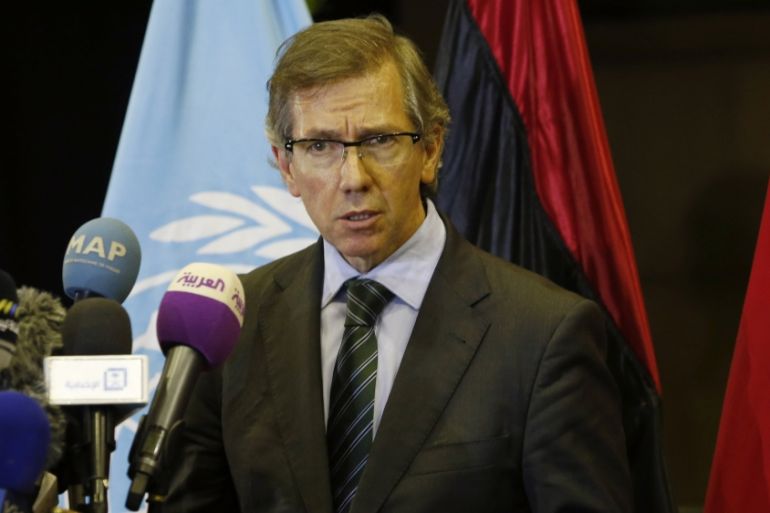Anger at UN chief negotiator in Libya’s new job in UAE
Tripoli-based government demands probe into role for Bernardino Leon in UAE, which openly backs rival administration.

The decision by the UN’s chief negotiator in Libya to step down and take up a job in the United Arab Emirates (UAE) has triggered a furious response from the country’s legally installed government in Tripoli which has asked the UN to investigate.
Noori Abou Sahmain, the president of Libya’s General National Congress, voiced concern that Bernardino Leon had taken up a post in Abu Dhabi, the capital of the UAE, which openly backs a rival UN-recognised government in Tobruk.
“The timing of the envoy’s new job while he is asking us to accept his suggestions as fair and unbiased, shows disrespect for the Libyans people and their sacrifice,” said Sahmain.
“This new appointment risks to destroy the political process.”
UN spokesman, Stephane Dujarric, dismissed suggestion of a conflict of interest by Leon, who reportedly accepted the position while he was negotiating with the Libyan parties.
“Mr Leon’s tireless work to bring the parties in Libya together in a government of national accord and resumed transition speaks for itself,” Dujarric said.
According to a UN statement released on Wednesday, Martin Kobler, the former German ambassador to Iraq and Egypt, will replace Leon.

Kobler has led the UN peace mission in the Democratic Republic of Congo over the past two years and has represented the UN in Afghanistan and Pakistan.
Benghazi deaths
Leon took up the post of special envoy for Libya in August 2014, winning agreement from all sides to negotiate a political deal. But the talks failed over appointments to government posts.
In the latest move to address power-sharing agreements, Leon offered to expand a proposed presidency council from six to nine members, made up of a prime minister, five deputy prime ministers and three senior ministers.
This step was to ensure more representation from Benghazi, Libya’s second city, where protests against the UN deal turned violent late last month, leaving at least 12 dead.
Libya descended into chaos after fighting between rival political factions and armed groups engulfed the country after 2011, when longtime leader Muammar Gaddafi was overthrown.
The country also has to deal with the threat of the Islamic State of Iraq and the Levant (ISIL), which has gained a foothold in Gaddafi’s former hometown, Sirte.
The international community is pressing Libya’s warring factions to sign a peace deal to calm turmoil that has been exploited by armed groups and human smugglers.